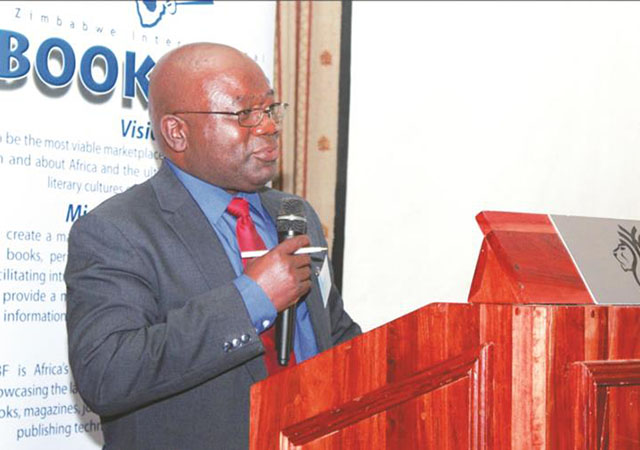ZIBF wants the book to pay

Stanely Mushava Literature Today
The Zimbabwe International Book Fair (ZIBF) convenes in Harare today for the main edition, running from July 31 to August 5 under the theme “Making the Book Pay”.
The book fair week is made up of the Indaba, book exhibitions and sales, live literature performances, writers’ workshop and librarians’ workshop.
Children figure prominently in ZIBF programmes with a Junior Achievers Competition, Meet the Author Sessions, Children’s Reading Tent, Digital Zone and Live Literature specially packaged for them.
The Indaba, running today and tomorrow, is the flagship interface where writers, publishers, booksellers, librarians and academics discuss the year’s theme at a Harare hotel.
This year’s Indaba features topics, “The Economics of the Book”, “Intellectual Property and Copyright”, “Information Literacy Skills for the Digital Age”, “Creating the Africa We Want through Reading (Africa Agenda 2063)” and “The Book and Cultural Preservation, Conservation and Transmission”.
Writers and librarians will then cut away to sector-specific workshops sub-themed “How to Write a Book that Pays!” and “How Librarians Make the Book Pay!” respectively.
“Both platforms accord opportunities to discuss and address critical issues and exploit synergies that are beneficial to the book sector and help contribute to Making the Book Pay! while growing the creative industry or book industry,” Zimbabwe Book Fair Association (ZIBFA) chairperson Blazio Tafireyi said in a statement.
Part of the fair’s appeal are the marked down books at publishers and booksellers’ stands in Harare Gardens on Thursday and Friday. Although this is not the general rule, knowing your corners can be rewarding. Few years ago, I left the garden few Shona classics richer for ridiculous discounts.
A digital library called eBook Central, partnering more than 9 000 publishers around the world, will be courting university librarians and students.
Coming from an environment where students make do with free content and complain about not affording books, I think learning more about these gateways to globally sourced, up-to-date books and journals, accessible through the university library, is the right thing to do.
One of the main problems with ZIBF is lukewarm public participation as the fair compares unfavourably to other flagship events in the culture economy. The organisers may want to extend their tent through unconventional marketing offensives running around the year.
The updated primary and secondary education curriculum may prove easy clickbait for the book fair as new content for schools will be on display, with producers in attendance to take customers’ questions.
“We are extending our invitation to parents and their children in schools in Zimbabwe to visit the Book Fair Exhibitions from August 2 to 5 August 2017 to sample books for educational advancement, professional development and individual intellectual growth,” chairperson Tafireyi said.
“In particular, we also wish to extend a warm welcome to headmasters, teachers, scholars, librarians, researchers, publishers, booksellers, designers, editors and members of the general public to visit the Zimbabwe International Book Fair to discover the opportunities that lie in books for entertainment, education and knowledge acquisition, thus making the book pay.
“There will be books for the new curriculum, academic scholarly books, children’s and leisure books, magazines, journals, e-books, DVDs and so much more on display by exhibitors during the book fair. Here is a chance for you to meet with your authors, booksellers, publishers, librarians, performing artists, novelists and poets,” Tafireyi said.
Indaba papers will be packed around the interests all participants in the book value chain, that is, authors, publishers, illustrators and designers; photographers, advertisers, distributors, librarians and users.
Predictably, ZIBF is modest about its 2017 theme, “Making the Book Pay”, tuning it up to speak equally to culture and commerce. For organisers, it is more than the industry cashing in more but also about deploying books to broader social imperatives.
As such, the Indaba is also making the connection between books and development-themed documents, particularly the Zimbabwe Agenda for Sustainable Socio-Economic Transformation (Zim- Asset), Africa Agenda 2063 and the UN 2030 Sustainable Development Goals.
“The ‘pay’ in wealth creation connotes eradication of poverty through reading. It also enables inculcating the reading habit and sustaining reading skill in young people, maintain high literacy levels, enable people to realise their aspirations and successes through education and to advance themselves,” ZIBFA said in a statement.
Organisers are also looking to deploy books to increase food security and nutrition, eradicating diseases, decrease child mortality, increase revenue inflows for the book industry, alleviate poverty, contribute to employment creation and provide equitable access to information.
Well, one must have a heart of steel not to like the Zimbabwean book industry. Although visibly struggling and downgraded, it has to go through the whole development checklist instead of putting the mask off and going for the mammon. May the odds be in the industry’s favour that Philistines may bow at its feet?
Under the segment, “Creating the Africa we want through reading (Africa Agenda 2063),” participants will discuss teaching children to read at an early age, the role of the parents in reading, stimulating and inculcating the reading habit, new perspectives in reading and the pros and cons of remedial reading.
“Information Literacy Skills for the Digital Age” convenes discussions around reading, writing and publishing for survival, balancing e-reading and physical reading for sustainable development, assimilating social media technologies, technology-enhancing pillars for sustainable development, challenges and opportunities for libraries in the digital era.
Under “Economics of the Book”, making academic research, writing and publishing pay, innovation in book development, marketing and distribution, inclusivity in research, writing, publishing and reading for vulnerable and marginalised groups, author, publisher and reader dynamics and making the book affordable and writing for communicable diseases and life-threatening conditions will be deliberated.
“The Book and Cultural Preservation, Conservation and Transmission” discusses STEMitising reading for socio-economic development, making the book relevant to urban and rural children, promoting culture in the digital age, challenges and opportunities of writing and publishing books in indigenous languages, cultural dynamism and change, culture as a foundation for building peace and social cohesion and Zimbabwe’s new education reform.
In the past, reporting on ZIBF has starkly contrasted the present to the golden past of the early 1990s. If you want to see a change in the fortunes of the ZIBF, be there and make it happen. Young adults, I am not seeing you. This is your institution.
Feedback: [email protected]









Comments